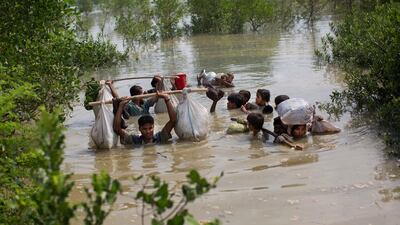Some 123,000 Rohingya refugees have fled to Bangladesh since violence erupted in Myanmar on August 25, much higher than previously thought, the UN refugee agency said on Tuesday.
That higher number, revised up from 87,000 estimated on Monday, was the result of aid workers conducting new, more accurate counts at both established and makeshift refugee camps, said UNHCR spokeswoman Vivian Tan. It did not mean all 36,000 new refugees counted had entered in the last 24 hours.
"The numbers are very worrying. They are going up very quickly," Ms Tan said.
Their arrival has raised fears of a fresh humanitarian disaster as already crowded camps in Bangladesh - home to around 400,000 Rohingya refugees before the latest crisis - struggle to cope with the influx.
Many are sleeping in the open air and are in dire need of food and water after walking for days to reach safety, the UN's main coordinator in Bangladesh said in a report.
"As a result of flood-like arrivals of new refugees, a massive humanitarian crisis is unfolding here," the prominent Bangladeshi rights campaigner Nur Khan Liton told AFP.
"People are staying in refugee camps, on the roads, school yards and under open sky. They are clearing forest to create new settlements. There is an acute crisis of water and food."
Malaysia on Tuesday summoned Myanmar's ambassador to express displeasure over violence in Myanmar's Rakhine State.
Foreign minister Anifah Aman said the latest incidents of violence showed that the Myanmar government had made "little, if any" progress in finding a peaceful solution to problems facing the Rohingya minority, most of whom live in the northwest Myanmar state near the Bangladeshi border.
"Given these developments, Malaysia believes that the matter of sustained violence and discrimination against the Rohingyas should be elevated to a higher international forum," Mr Anifah said.
Turkish president Recep Tayyip Erdogan on Tuesday also condemned the escalating human rights violations targeting the Rohingya Muslim minority during a phone call with Myanmar's civilian leader Aung San Suu Kyi, Turkish presidential sources said.
In the phone call with Suu Kyi, a former political prisoner of Myanmar's junta, Mr Erdogan said growing human rights violations against Rohingya Muslims "deeply concerned" the entire world, sources from his office said.
Turkish foreign minister Mevlut Cavusoglu will visit Bangladesh on Wednesday, the state-run Anadolu news agency reported.
The UNHCR was pleading for assistance, saying it needed more land to be made available so it could set up new camps to accommodate the massive influx of refugees arriving hungry, traumatised and in need of medical assistance.
"Most have walked for days from their villages — hiding in jungles, crossing mountains and rivers with what they could salvage from their homes," the agency said.
"An unknown number could still be stranded at the border," it said.
Thousands are streaming daily across the swampy border, having walked for days through forests and rice paddies to reach safety in Bangladesh. Others were attempting to cross the river that separates the two countries, and at least several dozen have drowned in the attempt.
Many were arriving with stories of their homes being set aflame and Myanmar soldiers firing indiscriminately around their villages in Rakhine state.
_______________________
Read more:
Suu Kyi faces increasing international pressure to address Rohingya crisis
'Beheadings of Rohingya children', arson and widespread abuses in Myanmar
Malala Yousafzai calls for Aung San Suu Kyi to condemn violence in Myanmar
_______________________
In the border town of Kutupalong, an elderly woman - bleeding profusely from where her lower right leg had been blown off in an explosion - was bundled into a rickshaw to be taken to a hospital. Wailing family members told The Associated Press she had been wounded in a land mine blast. Her left leg and parts of her hands also appeared seriously wounded.
The massive influx of Rohingya refugees fleeing recent violence in Myanmar has pushed aid services in Bangladesh to the brink, aid workers said on Tuesday.
Older, established refugee camps that have been housing Rohingya since the 1990s have already reached capacity. Tens of thousands of new arrivals had nowhere to go, and were sheltering in makeshift camps, in village alleys, on open roads or in fields.
Thousands of others were now sheltering under emergency tents, in makeshift camps or out in the open wherever they found space.
But aid agencies said there was an urgent need for emergency shelters and medical aid as more refuges continue to arrive.
The latest influx of Rohingya began after August 25, when Rohingya insurgents attacked Myanmar police posts, prompting security forces to respond with "clearance operations" they said were aimed at rooting out insurgents from villages.
Both Myanmar security officials and Rohingya insurgents accuse each other of committing atrocities in the last week.
Refugees are arriving in Bangladesh with stories of their homes set aflame and Myanmar soldiers firing indiscriminately around their villages.
The Rohingya have long faced discrimination in Myanmar, but bloody rioting in 2012 forced more than 100,000 into displacement camps in Bangladesh, where many still live today.
* Agence France Presse, Associated Press and Reuters

